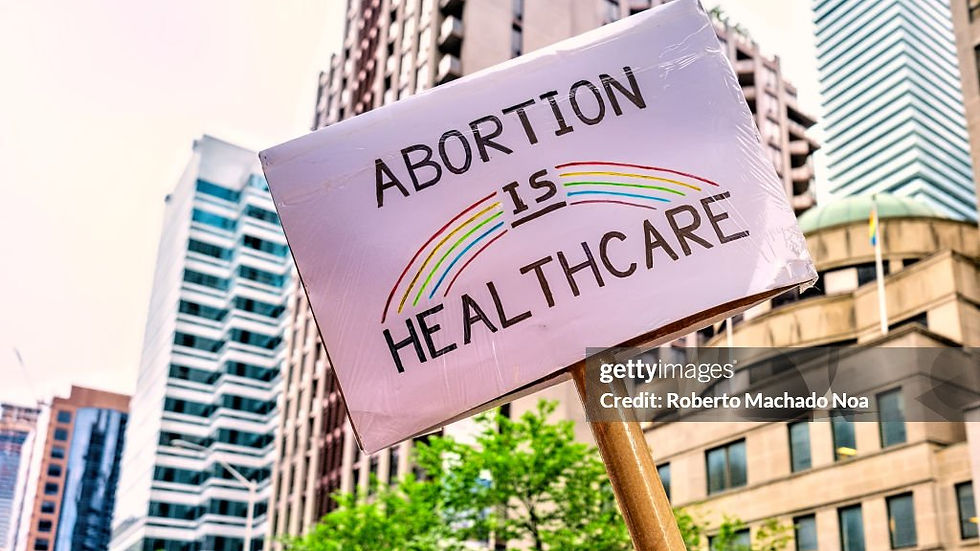The Significance of Decriminalising Abortion in the UK: A Step Towards Compassionate Healthcare
- Georgia Crisp-Mills
- Jun 19, 2025
- 3 min read
Updated: Jul 14, 2025
On 17 June 2025, MPs in England and Wales voted overwhelmingly in favour of decriminalising abortion. The amendment to the 1861 Offences Against the Person Act passed by 379 votes to 137. This marks the most significant advance in abortion rights since the 1967 Abortion Act.
This change means that no woman or pregnant person can be criminalised for ending a pregnancy on their own terms. Importantly, it does not change gestational limits or how clinical abortions are provided. Instead, it removes the threat of prosecution for those who self-manage their abortion, especially with pills at home.
It is a long-overdue act of compassion, clarity, and care.
Why This Legislative Change Matters
For years, too many women have faced investigations or charges under outdated laws for miscarriages or for using abortion pills without following strict formal processes. These experiences were traumatic and unnecessary, often pushing people further away from the help they most needed.
Campaigns like #End1861 have gained traction, supported by over 30 organisations, including BPAS, MSI Reproductive Choices, RCOG, and Cosmopolitan UK. These efforts brought national attention to the injustices faced by women. As highlighted by Cosmopolitan, one in three UK women will have an abortion in their lifetime. Yet, the law still treated some of them as criminals for making personal healthcare decisions.
‼️ Nine out of ten UK adults support the right to choose. This vote finally reflects that reality! ‼️

Recognising Personal Stories: The Case of Adriana Smith
While the UK moves toward more compassionate abortion laws, a heartbreaking case from the US shows what can happen when reproductive choice is stripped away. In Georgia, 31-year-old nurse Adriana Smith was declared brain-dead in February while pregnant. Under the state’s “fetal heartbeat” law, doctors were legally required to keep her body alive on life support, against her family’s wishes. It wasn’t until June that her baby, Chance, was delivered prematurely, weighing just over 1lb.
Adriana’s family endured an agonising ordeal for months. They were forced to watch as the law prioritised a pregnancy over a person’s dignity and autonomy. This was not care; it was coercion, disguised as policy.

Addressing Common Concerns about Decriminalisation
Some commentators, including those in The Telegraph, argue that decriminalising abortion risks making it “too easy” or undermining women’s rights. However, it is essential to clarify a few points:
Decriminalisation is not deregulation. Medical standards will still apply. Abortion after 24 weeks remains tightly controlled.
This is about compassion, not chaos. Removing the criminal threat does not increase abortion rates. Instead, it ensures that individuals aren't penalised for taking control of their reproductive health.
True feminism trusts women. To suggest that women cannot be trusted with their own bodies is to undermine the principle of gender equality.
Abortion is not a decision taken lightly. It should not be surrounded by fear, shame, or stigma.
What Needs to Happen Next for Abortion Rights
In the UK, several steps must be taken to ensure that possible challenges are addressed:
Strengthen access to early abortion care, especially in underserved regions.
Support telemedicine and other modern, safe pathways for obtaining abortion care.
Continue advocating for inclusive and non-judgmental sexual and reproductive education that empowers individuals.
For the US and beyond, advocacy must include:
Laws that prioritise living people’s rights over legal abstractions.
Ensuring that no family undergoes what Adriana Smith’s family faced.
Promoting reproductive justice for everyone, regardless of income, race, faith, or geography.

At WIG 🧡, We Stand For Comprehensive Reproductive Rights
Bodily autonomy without punishment. No one should be criminalised for managing their own healthcare.
Trauma-informed care. We support individuals whose reproductive journeys have been shaped by violence, loss, or marginalisation.
Community solidarity. Choice must be accessible for everyone, not just those with power or money.
We stand with Cosmopolitan UK, the #End1861 campaign, and all those working to ensure abortion is recognised as what it truly is: healthcare.
✊ Take Action
Share this blog and help end stigma.
Write to your MP to express your support for accessible, compassionate abortion care.
Support charities and collectives fighting for reproductive rights globally.
Above all, speak up. The fight for choice doesn’t end with a vote; it begins with voices like yours.
It’s time to ensure the principle of bodily autonomy is upheld, reflecting true reproductive freedom for all.




Comments